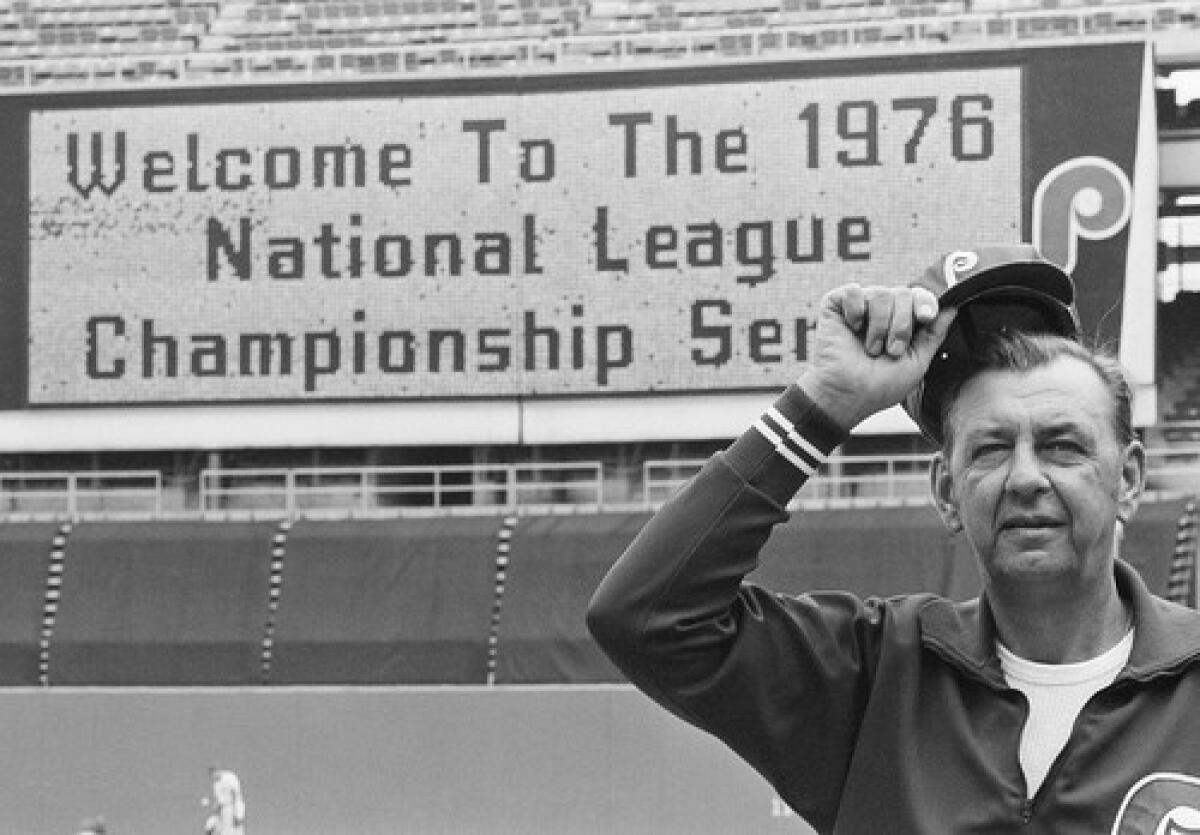Danny Ozark dies at 85; former Dodger coach managed the Phillies to three division titles in the 1970s

- Share via
Danny Ozark, a onetime Dodger coach who went on to manage the Philadelphia Phillies to three division titles in the 1970s, died Thursday at his home in Vero Beach, Fla. He was 85.
His death was announced by the Phillies; the cause was not given.
Ozark managed the Phillies for most of seven seasons, compiling a record of 594-510 from 1973 until he was fired in August 1979. He led the team to National League East Division titles in 1976, ’77 and ‘78, but the Phillies failed to reach the World Series, falling to the Cincinnati Reds and twice to the Dodgers in the National League Championship Series. In 1976, he was named manager of the year by the Associated Press and the Sporting News.
“Danny was a great human being. He was first-class and a fine gentleman who really cared deeply about his players and his friends. His patience with some of the Phillies’ young players in 1973-75, particularly with Mike Schmidt, really paid off,” Phillies Chairman Bill Giles said Thursday.
Ozark was known for his easygoing clubhouse manner but sometimes testy relationship with the Philadelphia press corps, which skewered him for such verbal manglings as “Mike Anderson’s limitations are limitless.”
And Phillies fans never forgave Ozark for failing to make a defensive substitution for Greg Luzinski, the powerful slugger who also was a lumbering left fielder, in the 1977 playoffs against the Dodgers. In the top of the ninth inning of Game 3 of the NLCS, with the Phillies holding a two-run lead, Luzinski couldn’t handle pinch-hitter Manny Mota’s drive to deep left that bounced off the wall for a double.
The Dodgers rallied to win the game, taking a 2-1 series lead. They won the best-of-five set the next night.
“Maybe Jerry Martin would have caught the ball,” Ozark told a Philadelphia Daily News reporter in 2001, 24 years after he had left Martin on the bench and Luzinski in the game. “Who knows?”
The next season, Dallas Green, who replaced Ozark as manager, led the Phillies to a World Series championship.
Before joining the Phillies, Ozark had been a Dodgers coach under Walter Alston from 1965 through 1972. After the Phillies let him go, he returned to the Dodgers as one of Tom Lasorda’s coaches from 1980 to 1982. He then became a coach with the San Francisco Giants and served as interim manager in 1984 after Frank Robinson was fired late in the season.
He was born Daniel Leonard Orzechowski in 1923 in Buffalo, N.Y., to parents of Polish descent. His father changed the family name to Ozark. A 6-foot-2, 200-pound first baseman, Ozark broke into the minors in 1942 with the Brooklyn Dodgers’ affiliate in Olean, N.Y.
It wasn’t long before he was drafted into the Army and shipped to Europe, where he fought in the Battle of the Bulge.
After his discharge, he returned to the Dodgers in 1946 and traveled to a succession of minor league outposts, including Abilene, Texas; St. Paul, Minn.; Elmira, N.Y.; and Fort Worth. A solid player, Ozark was stuck in the minors while Gil Hodges maintained his hold on first base with the Dodgers.
After the 1955 season, the Dodgers asked Ozark to consider managing in the minors, and he moved around the organization before being called up to the big-league staff. Ozark eventually became Alston’s third-base coach.
Ozark married the former Ginny Zdinski in 1949, and in 1960 they moved to Vero Beach, the Dodgers’ former longtime spring training home.
Besides his wife, he is survived by a son and a daughter; three grandchildren; and four great-grandchildren.
More to Read
Start your day right
Sign up for Essential California for the L.A. Times biggest news, features and recommendations in your inbox six days a week.
You may occasionally receive promotional content from the Los Angeles Times.




